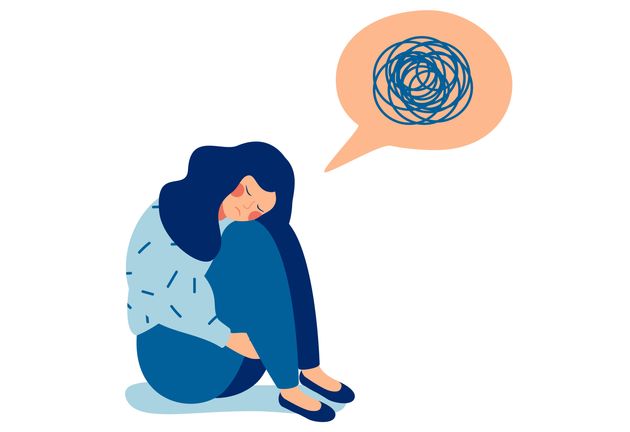
Tip #3: Seek therapy if you need it
Graduate school can feel like a multi-pronged attack on your psyche. Not only do you have to deal with your individual project, but you also have to navigate relationships with other people, your career aspirations, and your life outside of academia. No wonder it can get overwhelming! Studies have shown that graduate students are between three to six times as likely to suffer from depression and anxiety compared to the rest of the general population1,2. The COVID-19 pandemic has made the situation worse, by increasing the number of graduate students suffering from these conditions3. You should seek therapy from a professional when you start feeling overwhelmed. Otherwise, you might end up suffering from the repercussions of prolonged and severe mental hardship.
As a graduate student, it is natural to slip into the mindset of “I have to do everything myself” / “I can do everything myself”. After all, we are supposed to become independent researchers, right? The reality is that you shouldn’t and don’t have to do everything yourself. It is important to realize when you should seek help in any of your endeavors.
Seek therapy. Seek it early.
I’m going to be completely honest. The topic of mental health has been extensively talked about since I started grad school. Yet, I never seriously considered seeking counseling until this year. It was not because I had not experienced major setbacks in the past couple of years. I was just too skeptical about the efficacy of the process. Would the therapist be able to help? How would they be able to tell me things about myself that I didn’t already know? Even though many of my friends had spoken glowingly about their experiences with counseling and therapy, I did not end up pursuing it until my mental health plummeted this year.
With the ongoing isolation of the pandemic, lab shutdowns, and personal problems, I became a shell of myself. Before the pandemic, I loved going to museums, cultural events, concerts, hosting meals, and seeing my friends. After the pandemic, all of these opportunities disappeared, and all I had to focus on was my work. Labs were shut down, so I couldn’t even properly pursue that. (That’s not to say one should feel compelled to stay super productive during a pandemic. Take care of yourself!). When I started to deal with some personal issues outside of work, I felt like my body was folding in and consuming itself. I wasn’t eating or sleeping well. I found myself living in a constant state of anxiety, with an unbelievable amount of pressure on my chest weighing me down every day. This was the point at which I decided I needed help.
Things to consider when you seek therapy
When you first seek counseling, you should know that not everyone will be a right fit for you. This is because every person has their own unique way of interacting with you. I initially reached out to 4 professionals. One told me he did not have any availability. Another chatted with me on the phone, but I did not feel that it would be a good fit for me. I ended up talking with the other two for a few sessions. Out of those, I only clicked with one, who is currently helping me figure things out. Don’t feel embarrassed or ashamed to talk with multiple people. You are seeking the best help for you, and you should base it on a subjective measure of compatibility.
So what are sessions usually like? The first couple of sessions serve for you to explain why you need counseling. You will tell them about your circumstances and feelings at that time. Be as honest and comprehensive as possible. Don’t worry about trying to capture their interest. After hearing your initial thoughts, they will engage with you. My therapist listens to what I have to say, affirms it, and offers an assessment of how I spin things in my mind. As I was spiraling into a hole of depression, my mind would fixate on one interpretation of events, even if that interpretation was illogical. I knew that there were other interpretations that were more reasonable, yet I couldn’t bring myself to accept them. My therapist would gently reiterate these other, more reasonable interpretations. Since it was coming from an outside party, I was more readily able to internalize more positive interpretations of my circumstances.
Don’t wait until it gets worse.
Don’t wait, like I did, until things get really really bad. Just like any other health issue, there are stages, and each will require different levels of intervention. If you feel like you are having some difficulties, seek counseling now! As graduate students, counseling and psychotherapy is often subsidized under the health insurance provided by your academic institution. You should check with your student health office to see which professionals they can refer you to. Invest in your own mental health. “An ounce of prevention, is better than a pound of cure”. The road to the PhD is long and difficult, and we can all benefit from being gentler with ourselves.
Other reasons why you should seek therapy
A helpful aspect of therapy is that it allows me to vent and vocalize all of my tumultuous and heavy feelings. Before, I leaned on my friends to listen to all my problems. Though I still do, I did not want to talk about the same events over and over again, endlessly analyzing my own feelings. In a professional help setting, this is encouraged. I have an hour slot every week to talk about whatever I want. If I want to rehash everything over and over again, I can. Every time you talk about that which is troubling, you can learn something new about yourself, your thoughts, and your motivations.
Therapy helps me exit my own circle of perseveration. If you seclude yourself in your own thoughts, you won’t see the wide ocean of possibilities out there because you will feel like you are swimming around in a small pond. With professional help, you won’t be stuck in this mind trap forever. You will grow. I am still not at the stage where I can see the silver lining to all my troubles, but I know that I will one day. If my sessions just offer a temporary reprieve one day a week for now, that is still a good place to be. Our mind states are important and deserve care. For example, if you have to deal with micro-aggressions on a weekly basis, or have to endure strong social pressures, seeking counseling could be incredibly rewarding.
Seek therapy even if you don’t “need” it.
You don’t have to wait until there’s “something” that pushes you towards therapy. True, counseling can be a useful tool that can be preventative and restorative, but it can also be incredible insightful. Having a professional with whom you can effectively talk about anything you want without the added social pressure of it being someone you know can become a liberating feeling. Often times, because we feel like we need to be productive all the time, we neglect time we should spend with ourselves. Having counseling once a week turns into a scheduled moment of self-care, a gift to yourself.
There used to be strong negative stigma associated with going to therapy and thankfully, that stigma has started to fade away. I have friends that talk about sessions they have in therapy all the time — and it’s totally normal. So, use the resources around you, especially if you are in an institution which will likely subsidize them. Seek therapy when you need it and try it out when you don’t. You are important.
__________________________________________________________________________________________________________________________________________
As always, you can reach out to us @phdxlife on Twitter if you have specific questions/suggestions about this topic or others in our posts.
